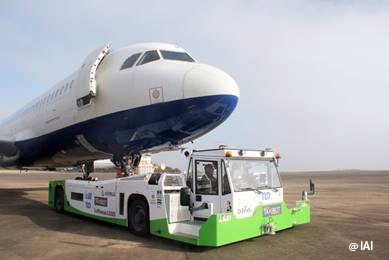Taxibots, E-Taxi systems, single engine taxiing are some of the technologies under investigation by partners in the SESAR JU AEON project to reduce significantly CO2 emissions caused by aircraft taxiing at airports.
Funded within the framework of Horizon 2020, the Advanced Engine Off Navigation (AEON) project aims to define a concept of operations for engine-off taxiing techniques, making use of novel technologies that are coming onto the market, such as:
- Non-autonomous taxiing, such as TaxiBots, a hybrid towing vehicle which, unlike the normal pushback trucks, can tow full aircraft to near the start of the runway, without the aircraft having to start its engines. This is expected to reduce fuel consumption during taxiing by 50% to 85%.
- Autonomous taxiing like E-Taxi system, which relies on electric motors embedded in landing gear to allow planes to push back and taxi without their jet engines running - saving fuel, curbing emissions and ending last-minute delays while waiting for airport tugs. This is expected to reduce fuel costs by around 4% of the overall consumption, 50% of taxi fuel and up to 85% of ground operations costs considering other benefits like pushback costs, brake wear...
- Single engine taxiing, which involves using only half the number of engines installed to generate the energy needed for taxiing, reducing taxi fuel consumptions by 20%.
Importantly fuel savings translate into reductions in CO2/NOx emissions, while minimising engine use results in reduced noise.
Bringing together knowledge and expertise from research partners ENAC, Deep Blue and TU Delft, the project will work closely with airports, airlines and manufacturers on developing the following:
- Overall aircraft engine-off navigation concept of operations, detailing how the three eco-friendly solutions above may combine in the airport surface management process both at strategical and tactical level in order to minimise fuel consumption and emissions without impacting arrival and departure flight schedules;
- Business model to help airports and/or airlines evaluate their benefits in the implementing these technologies;
- Real-time evaluation of environmental indicators to support decision-making, conflict free routing for all vehicles, reallocation of techniques to adapt to in real time.
The project will aim to ensure that their approach can be integrated in to airport collaborative decision-making tools.
The research is very much in line with the SESAR JU’s goal of delivering solutions to make aviation smarter and more sustainable in support of the Commission’s strategy in this area.

This project has received funding from the SESAR Joint Undertaking under the European Union's Horizon 2020 research and innovation programme under grant agreement No 892928
